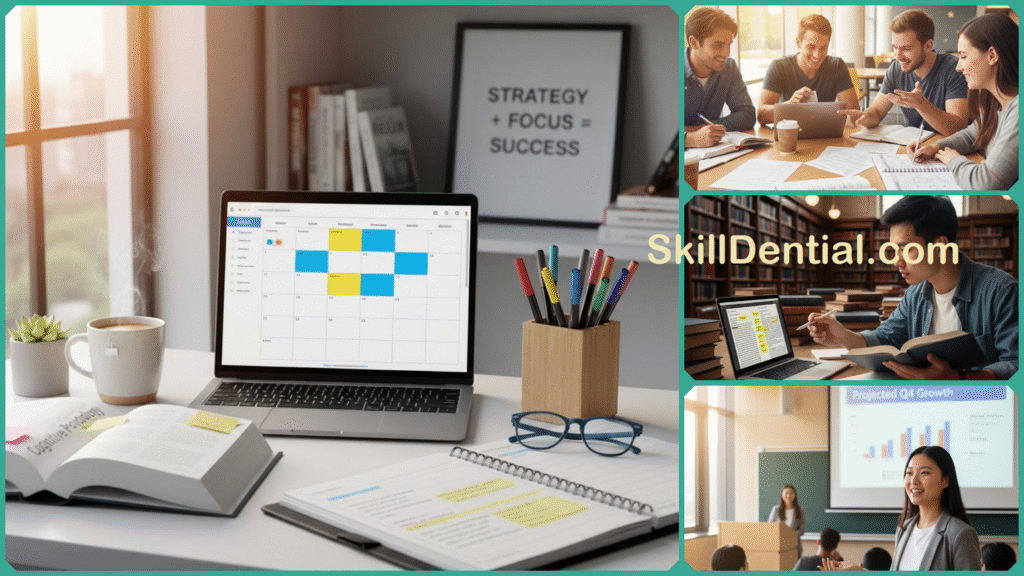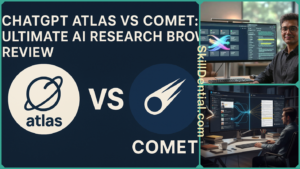Academic success is influenced by much more than just intelligence or the amount of hard work a student puts in; it relies significantly on the mastery of particular skills that enable students to manage their learning processes both efficiently and effectively. These essential skills help students organize, understand, and apply knowledge in ways that maximize their potential for success in academic environments.
Whether you are a busy college student juggling multiple coursework assignments, a dedicated Ph.D. candidate balancing the demands of research and teaching responsibilities, or a high schooler preparing rigorously for the challenges of college-level academics, developing strong core academic success skills can greatly enhance your overall productivity and help you manage and reduce stress more effectively throughout your educational journey.

This post explores the 11 crucial academic success skills that are designed to help you accomplish more tasks in a shorter amount of time, significantly enhance your overall academic performance, and develop sustainable habits that will support lifelong learning and personal growth.
Why Academic Success Skills Matter
Academic success skills are critically important because they represent a foundational and comprehensive set of abilities and strategies that empower students and researchers to effectively assimilate, process, and apply knowledge in various contexts. These skills are essential for organizing their work systematically and achieving consistently high-quality results in their academic pursuits.
Importantly, academic success skills extend far beyond simply memorizing facts or recalling information; they encompass a broad range of critical competencies such as time management, critical thinking, goal setting, and effective communication. By mastering these vital skills, individuals are better equipped to
- Handle demanding academic workloads
- Juggle multiple responsibilities
- Manage priorities efficiently
This balanced approach not only enhances productivity but also significantly reduces the risk of burnout, enabling sustained academic performance and personal well-being over the long term. Evidence from educational research strongly supports the value of developing academic success skills.
One notable meta-analysis by Hattie, Biggs, and Purdie (1996) found that interventions focused on study skills, self-management of learning, and motivation significantly improve student achievement. The effectiveness is highest when these skills are taught within specific disciplinary contexts, helping students gain deeper knowledge and perform better academically.
More recent studies reinforce this by showing that embedding academic skills training in curricula enhances students’ critical analysis, problem-solving, and communication abilities, which leads to improved academic performance and greater ability to transfer skills across different subjects or real-world contexts.
Besides boosting academic outcomes, developing these skills also improves students’ overall well-being. Academic skills foster self-regulation and motivation, which reduce anxiety and stress related to academic pressures. Well-designed academic support programs that teach skills like writing, study strategies, and discipline-specific literacies have been shown to increase student retention and satisfaction, particularly benefiting students from historically disadvantaged backgrounds, thereby promoting equity and inclusion.
Academic success skills are incredibly valuable not only throughout the period of formal education but also extend far beyond it, proving to be highly transferable and useful in various professional settings as well as lifelong learning environments. These skills significantly contribute to improving employability prospects and support continuous personal growth and development throughout an individual’s entire life.
In Summary
Academic success skills are incredibly important because they serve as a comprehensive toolkit that empowers learners to thrive not only academically but also personally. These essential skills enable students to excel in their studies by providing strategies for effective learning and problem-solving.
Additionally, they help individuals manage various challenges with confidence and resilience, allowing them to navigate obstacles smoothly. Beyond the classroom or university setting, these skills support continuous personal and intellectual growth, ensuring that learners can sustain their development throughout their lives and careers.
The Key Academic Success Skills
The 11 key academic success skills are fundamental and indispensable competencies that significantly empower students and researchers to thrive and excel in their educational and scholarly pursuits by enabling them to efficiently manage their time, organize their work, and direct their intellectual efforts in a focused and productive manner:
Time Management
This essential skill plays a crucial role in effectively balancing various responsibilities such as academic assignments, work commitments, and personal life activities. It involves thoughtfully scheduling dedicated study sessions, carefully breaking larger projects into smaller, manageable steps, and setting realistic, achievable deadlines to stay on track.
By practicing good time management, learners can significantly reduce procrastination and enhance their overall productivity, allowing them to allocate their time in the most efficient way possible and meet their goals with less stress.
Research Skills
These essential abilities empower learners to effectively identify and select credible and reliable information sources, formulate thoughtful and pertinent questions, and systematically collect relevant data in an organized manner.
Mastery of comprehensive research techniques not only supports the production of high-quality academic writing but also promotes evidence-based work by encouraging a thorough and critical evaluation of all sources consulted during the research process.
Reading Comprehension
Engaging actively with a text through strategies like highlighting important points, summarizing the material in one’s own words, and asking thoughtful questions about the content significantly improves both understanding and long-term retention of information.
Additionally, consistently expanding one’s vocabulary plays a crucial and indispensable role in further enhancing overall comprehension. It helps in making the reading experience significantly richer, deeper, and much more meaningful by allowing readers to understand more complex texts and appreciate subtle nuances within the material.
Note-Taking
Using efficient methods such as the Cornell Method or mind mapping significantly helps in organizing information in a clear and structured manner. These techniques not only make it easier to review and understand key concepts but also greatly simplify the process of exam preparation and academic writing.
By carefully creating focused and well-organized study materials, students can significantly enhance their overall learning efficiency and greatly improve their ability to retain important information over time. This approach allows them to engage more deeply with the content and recall key concepts more effectively during exams or practical applications.
Self-Discipline
This essential skill plays a crucial and indispensable role in helping individuals maintain sustained and uninterrupted focus over extended periods. It enables learners to effectively prioritize their various tasks and responsibilities, allowing them to organize their workload in a way that maximizes productivity.
This skill motivates learners to take initiative and work independently, fostering self-discipline and reducing the need for constant supervision or external reminders. Using tools such as setting clear and achievable goals, minimizing distractions by creating a conducive learning environment, and organizing tasks through detailed to-do lists significantly strengthens one’s self-discipline.
This particular skill is absolutely vital and plays a crucial role in ensuring steady, consistent, and ongoing progress in various academic pursuits. It helps learners maintain their focus and stay on track throughout their educational journey, enabling them to achieve their academic objectives with much greater efficiency, determination, and a stronger sense of purpose.
Critical Thinking
By carefully analyzing information thoughtfully and deliberately, solving complex problems, and critically evaluating various arguments and perspectives, critical thinking encourages a much deeper level of engagement with the material.
This enhanced level of engagement significantly contributes to more informed, thoughtful, and effective decision-making processes, which are essential for achieving success in high-level academic work as well as in various scholarly pursuits and research endeavors.
Goal Planning
Using the SMART criteria to establish goals that are Specific, Measurable, Achievable, Relevant, and Time-bound offers a clear and focused direction for your efforts. This approach not only enhances motivation by providing well-defined targets but also encourages continuous effort and persistence.
Additionally, it provides robust support for effective progress tracking and accountability, significantly simplifying the process of monitoring achievements and evaluating success. This enhanced capability makes it much easier to identify areas that require improvement and to implement necessary adjustments throughout the entire process, ensuring continuous growth and better outcomes along the way.
Test Preparation
Effective exam preparation involves starting your study routine well ahead of time, allowing ample opportunity to absorb the material thoroughly. It also requires maintaining a consistent and regular review schedule, ensuring that you revisit topics frequently to reinforce your understanding and retention.
This approach significantly helps to reduce the stress and inefficiency associated with last-minute cramming sessions and instead promotes a much deeper and more thorough grasp of the subject matter over a longer and more extended period of time.
This approach should incorporate a wide range of methods, including taking numerous practice tests to simulate exam conditions, creating and reviewing detailed and comprehensive notes, and participating in collaborative group study sessions that encourage discussion and deeper understanding of the material.
This well-rounded approach significantly reduces anxiety and boosts overall performance, offering much greater benefits than relying on last-minute cramming, which often leads to stress and lower retention of information.
Memory Techniques
Using a diverse range of strategies, such as mnemonics, chunking, and visualization, significantly aids in the complex process of encoding and accurately recalling information. These effective methods not only support long-term retention of knowledge but also substantially enhance the overall efficiency and productivity of study sessions.
By actively employing these effective techniques, learners find it significantly easier to grasp, thoroughly understand, and successfully remember complex and detailed material over extended periods of time. This approach makes the overall learning experience much more manageable, engaging, and ultimately successful for individuals seeking to retain information efficiently.
Collaboration and Group Work
Achieving academic success frequently depends on effective teamwork, where strong communication, conflict resolution, and leadership skills play a crucial role. These abilities enable individuals to contribute meaningfully and work harmoniously within a group setting.
Moreover, such collaboration not only enhances individual performance but also significantly enriches the overall learning experience by fostering dynamic peer interaction and the exchange of diverse ideas and perspectives.
Presentation and Communication Skills
Developing clear and effective oral and written communication abilities is essential for students to confidently express their ideas and viewpoints. Whether crafting essays, delivering presentations, or engaging in group discussions, these skills help convey thoughts with clarity and purpose.
Regular practice in public speaking and concise writing not only enhances a student’s ability to communicate effectively but also fosters a sense of professionalism and strengthens their academic credibility in various settings.
In Summary
These skills collectively form the essential foundation for successful academic performance by promoting not only the acquisition of knowledge but also the development of effective learning behaviors and overall well-being. Extensive research consistently demonstrates that cultivating and integrating these skills within various educational settings leads to significant improvements in academic grades, boosts student motivation, and helps reduce stress levels.
Furthermore, it is important to highlight that these academic skills are highly transferable beyond the realm of formal education, playing a crucial role in enhancing lifelong learning capabilities and preparing individuals for future career success and adaptability in the workforce.
Mastering these 11 essential academic success skills thoroughly prepares learners to confidently and efficiently approach their studies as well as their future professional endeavors, equipping them with the resilience needed to overcome challenges and achieve long-term success.
Current Trends in Academic Productivity
Current trends in academic productivity are increasingly and significantly influenced by rapid technological advancements and innovative personalized learning approaches. These factors are profoundly reshaping how students, researchers, and educators manage and organize their academic responsibilities, tasks, and workloads.
The integration of innovative digital tools along with personalized learning strategies is significantly transforming traditional educational methods, resulting in much more efficient and highly effective academic performance and improved learning outcomes. This shift is revolutionizing the way students engage with educational content, allowing for tailored approaches that better meet individual needs and enhance overall success.
Technological Support for Productivity
A wide array of digital tools is now available to help learners streamline their study and research workflows. Digital planners and calendar apps enable efficient scheduling and time management, minimizing missed deadlines and reducing procrastination. AI-powered writing assistants support drafting, editing, and generating citations, significantly cutting down the time spent on routine writing tasks.
Learning management systems (LMS) play a crucial role in facilitating organization by centralizing various elements such as assignments, learning resources, and communications all in one accessible platform. This comprehensive centralization helps students effectively manage and stay consistently on top of their coursework, deadlines, and academic responsibilities.
Automation through these technologies allows students to allocate more time toward critical thinking and creativity, activities that deepen understanding and enrich academic output. However, ethical use of these technologies is crucial to maintain academic integrity and true learning.
Personalized and Metacognitive Learning
Educational trends increasingly focus on tailoring academic success skills to the learner’s specific discipline and individual learning style. Personalized learning encourages students to reflect on their thought processes (metacognition) and to self-regulate their study habits in response to ongoing feedback.
This approach helps learners adapt strategies to fit their strengths and challenges, leading to more effective and meaningful learning experiences. By contextualizing skills like research, analysis, and writing within the student’s particular academic field, personalized learning fosters deeper engagement and improves long-term retention and application of knowledge.
Together, these emerging trends emphasize a significant shift away from traditional one-size-fits-all study approaches toward more dynamic, technology-driven, and learner-centered strategies. These innovative methods are designed to enhance academic productivity and foster greater success by adapting to the unique needs and preferences of each learner.
This ongoing evolution in study techniques clearly reflects an expanding recognition of the critical importance of personalized learning experiences. These approaches increasingly leverage the vast power and capabilities of modern technology to effectively support, enhance, and optimize educational outcomes for learners across all levels and disciplines.
FAQs
How can I improve my time management as a student?
Begin by tracking how you spend your time to identify gaps and distractions. Use planners, scheduling apps, or digital calendars to block out fixed study periods for each subject. Break large tasks into smaller, manageable steps with specific deadlines, and set reminders to stay on track. Consistent planning helps avoid procrastination and reduces last-minute stress.
Are academic success skills the same as study skills?
Academic success skills and study skills are related but distinct. Study skills focus on techniques directly related to learning content, such as note-taking, reading comprehension, and memorization. Academic success skills include study skills plus broader competencies such as critical thinking, goal-setting, self-discipline, collaboration, and communication. Together, they form a comprehensive framework supporting effective learning and overall academic performance.
Can technology help me develop better academic skills?
Various technology tools enhance different academic skills: AI writing assistants help with drafting and editing; digital flashcards support memorization; planning apps improve time management; and learning platforms facilitate resource organization and group work. When used ethically, technology streamlines routine tasks, freeing more time for critical thinking and deeper study.
How can I stay motivated during intense academic periods?
Set clear, realistic goals with defined milestones to measure progress. Mix study methods to maintain engagement, take regular breaks to avoid burnout, and connect with peers for mutual support and accountability. Keeping your long-term aspirations in mind helps sustain motivation through challenging times.
What’s the best way to prepare for exams?
Avoid last-minute cramming. Instead, review material regularly over time using active recall techniques like practice tests and summarizing key concepts. Joining study groups can deepen understanding, reinforce learning, and reduce anxiety. Effective preparation leads to improved performance and confidence on exam day.
In Conclusion
Maximizing your academic productivity hinges on developing a core set of skills that go beyond just studying hard. Time management, research proficiency, active reading, self-discipline, critical thinking, and effective communication are among the fundamental abilities that equip you to succeed academically and professionally.
By embedding these 11 academic success skills into your daily routine, you will not only improve your grades but also reduce stress, manage your workload confidently, and build sustainable habits that serve you well beyond school.
Embrace technology thoughtfully and with careful consideration, set clear and achievable goals, and continuously refine and improve your study strategies over time to fully unlock and maximize your academic potential to the greatest extent possible.
Discover more from SkillDential
Subscribe to get the latest posts sent to your email.


